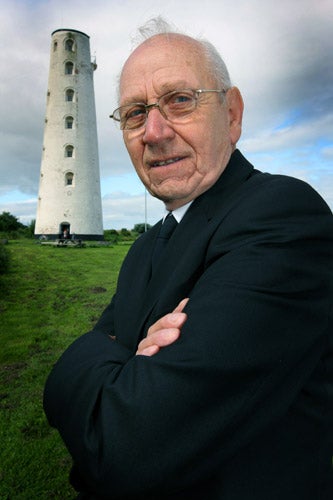First Person: 'I was one of the last lighthouse keepers'
Gordon Medlicott, 68

In my 32 years as a lighthouse keeper I serviced 22 lighthouses – not as many as some! The industry went though massive changes before we were finally made redundant in 1998 when automation took over. We knew about it from the early 1980s, so it didn't come as a shock. We saw the beginning of the end when they installed the helipads: no longer could bad weather stop boats getting out to fix the light, and that signalled the end of live-in keepers.
It takes three keepers to run a lighthouse. Some were family-run, which meant three families could be living together at one time – but my wife and two daughters only lived with me for four years during the early 1970s, before the girls started school.
In the early days we did two months at a time. It wasn't an easy job. Some of the lighthouses didn't have running water, working toilets or heating. Winters at Needles Rock, on the Isle of Wight, weren't great. We were confined to tiny rooms and often spent hours in the dark. Food wasn't exactly a highlight; we would start with joints of meat but they would soon disappear and usually it was all tinned. I'm sure every keeper has bad memories of corned beef!
My fondest memories are of Farne Island in Northumberland. The wildlife was beautiful and there was plenty of fishing. I loved telling the visiting public the story of our heroine Grace Darling, the lighthouse keeper's daughter who famously saved nine people in 1838.
Living in such close confines meant that a good relationship with the other two keepers was important. It was like a marriage – if you fell out, you couldn't go off and sulk for long because they would be cooking your dinner later on! We became experts at cards and board games. Over the years I knitted, did cross stitch and embroidered. I was the centrefold for Cross Stitch magazine a few years ago! We all read a lot and some of us wrote short stories and poems. I always enjoyed writing so was thrilled when the Association of Lighthouse Keepers asked me to write a research document for their archives. On completion it was snapped up by a publisher and turned into a new book called An Illuminating Experience (Whittles Publishing, out tomorrow).
Each year, the powers that be sent out a list of who was next to go. I knew I was going to be OK as it was "First in, last out" and I'd been there since the 1960s. There was lots of help with retraining and seeking alternative work, but by 1998 when I was finally called up, I was 57 and decided to take early retirement.
One myth of retirement is that you get to retire. Ha! I've never been busier. I do after-dinner speeches and talks at schools and Women's Institute meetings. The kids are great and you can never predict their questions, although they always want to hear about how I earned my medal for bravery from the Royal Humane Society.
I was manning the South Stack in Anglesey and two young boys ran to us for help. Their climbing instructor had fallen down a cliff face. I climbed down the 80ft drop and held on to him for 45 minutes while we waited for the rescue team. By the time they came we were up to our chests in water. The helicopter pulled us up one at a time. There is not much you can say to calm a man in that situation, you just try and quiet his screams.
I'm really pleased with the growing interest in lighthouses. New visitor centres open all the time. In fact, I'm going to a wedding on Nash Point in Wales next weekend. Not many people know that it's the only lighthouse you can marry on.
Lighthouses can also be lucrative as holiday lets, which I think is great. I did laugh when I heard they go for £800 a week now. I said to my wife, "I wish they had paid me that much to be there!"
Join our commenting forum
Join thought-provoking conversations, follow other Independent readers and see their replies
Comments
Bookmark popover
Removed from bookmarks